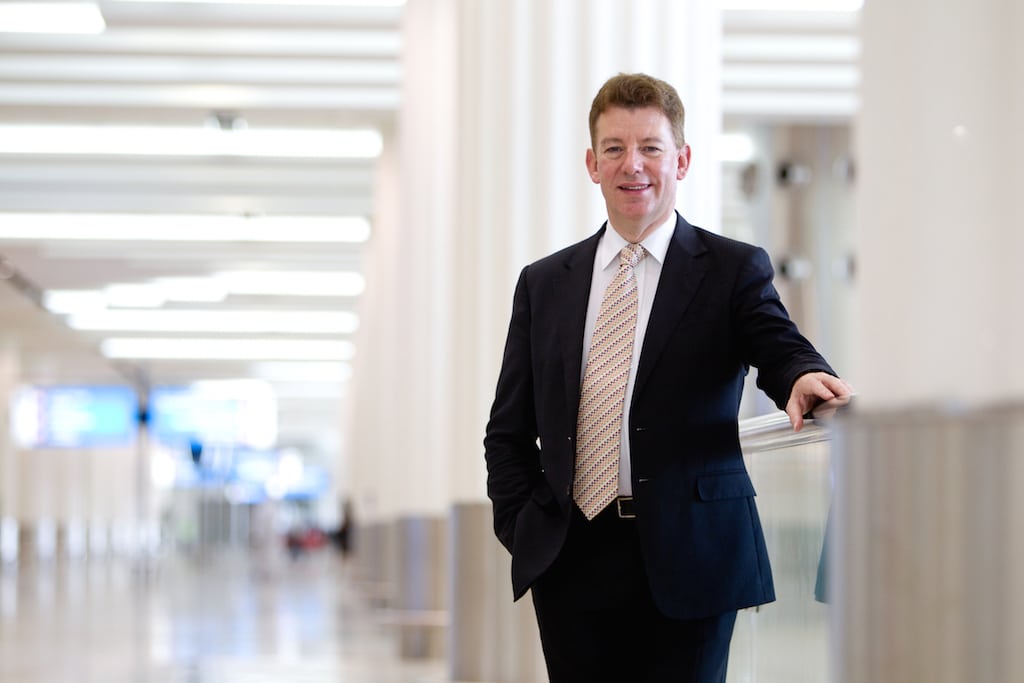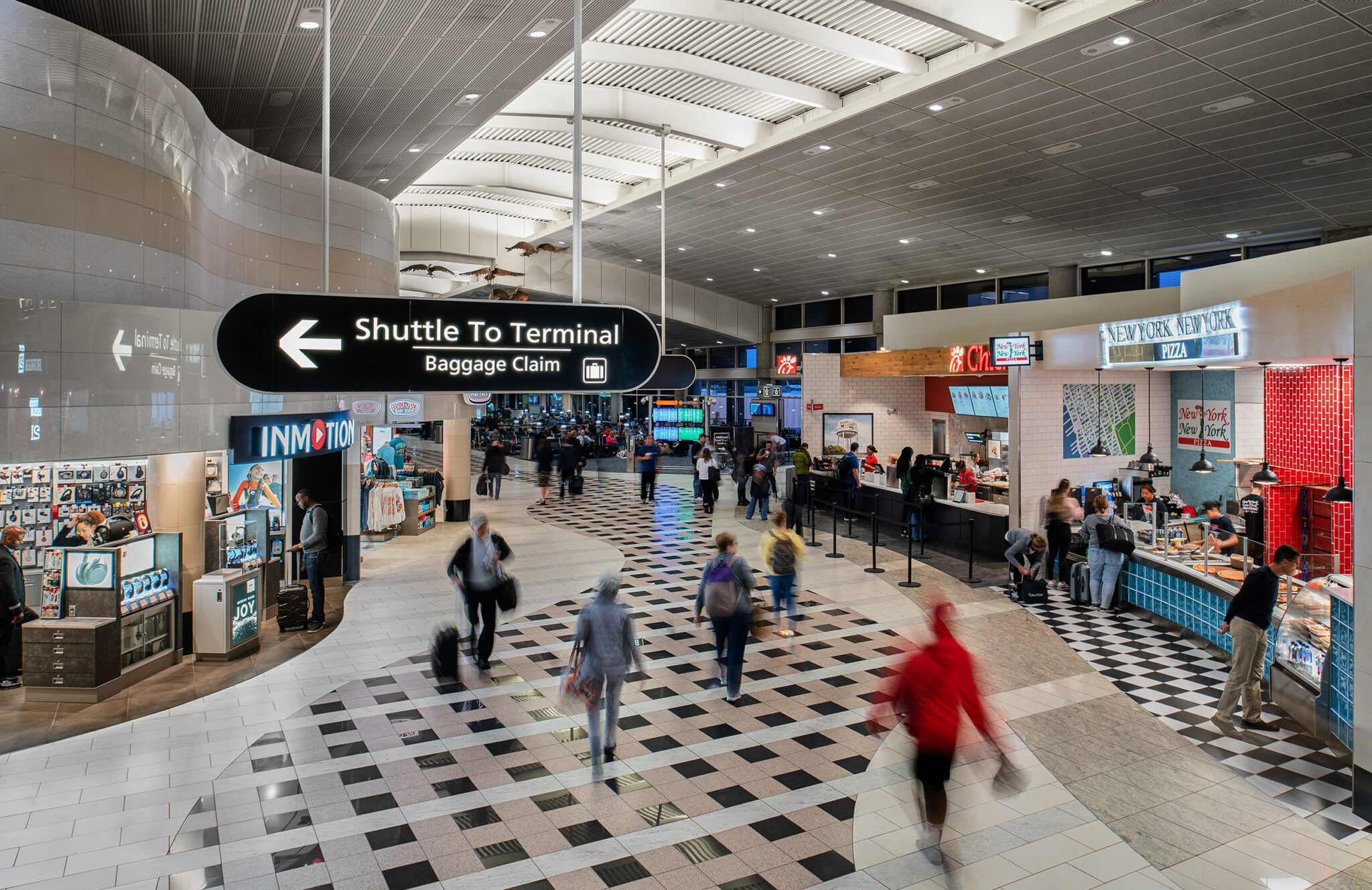Interview: Dubai Airports CEO on Transforming a Travel Pain Point

Skift Take
Dubai's main airport Dubai International made headlines last year when it surpassed London Heathow as the busiest international hub with 18.36 million international passengers in the first quarter of 2014.
The latest accomplishment of Dubai's world-largest attractions and infrastructure is only the start of the growth that Dubai Airports, the government organization that owns and manages the operation and development of Dubai International and still-in-development Al Maktoum International, has planned. Al Maktoum will be part of Dubai's airport city Dubai World Central and is expected to pass Dubai International as the world’s largest once it is fully up and running sometime after 2020.
The man responsible for managing such growth is Paul Griffiths, who has served as CEO of Dubai Airports since 2007. He previously held director-level positions at Gatwick Airport, Virgin Rail Group, and Virgin Atlantic Airways.
Skift recently spoke to Griffiths about his changing Wi-Fi strategy, local industry competition and cooperation, why airports are a major pain point in the travel journey, and his thoughts on fluctuating oil prices. An edited version of the interview can be read below:
Skift: Airports worldwide are integrating local culture into terminals, and passengers are responding positively to these local food and shopping options. Dubai is such a stop-over hub for a lot of people. What role is this new trend playing in Dubai International's and Al Maktoum's development?
Paul Griffiths: It’s clear when you look at the style of our airport infrastructure that we try to embrace a combination of state-of-the-art modern architectural design with local flavor and influence. A lot of the things that we do are influenced by the service standards of the Middle East.
There are two completely different facets of the service culture. One is the rhetorical service culture, steeped in the Arab tradition of hospitality, and one is the desire to be one of the world’s most modern and forward-looking cities. We have another dimension at the airport since the majority of people that actually travel through the airport are not coming to Dubai. We take that as an opportunity to influence them to come and stay when they are coming through next.
There are restaurants that reflect local flavor and there are local gifts in Dubai Duty Free, which is one of the most successful airport retailers in the world. We have local art displays, a dates festival, and a celebration for National Day. There’s plenty of options to really get the flavor of what the city is all about without leaving the airport.
Skift: Boingo Wireless became the exclusive Wi-Fi provider for Dubai International and Al Maktoum International in February with a tiered payment system. What kind of use have you seen so far? How many people pay for the upgraded service?
Griffiths: It’s very interesting to look at the take-up of Wi-Fi. There is now an almost insatiable demand. Demand goes up almost immediately to meet capacity as we put in more bandwidth and better service.
We’re getting to a point now where we’re starting to change the business model. We’re working with Boingo and our local service providers to give people what they want and not look at Wi-Fi infrastructure as a source of revenue, to instead look at it as enabling transactions with food and beverage offers, reminding people what’s available, or giving them incentives to spend money with us.
The partnership with Boingo has been a successful one. One thing that has surprised us is that every time we increase the capacity of our Wi-Fi capability, demand almost immediately shoots up to meet it. It’s something that everyone sees as necessary as air, water, food. It’s quite an incredible force to be reckoned with.
Skift: Are you saying that you make basic and upgraded Wi-Fi service available for free?
Griffiths: We’re getting to a point where we see Wi-Fi in a different way. Rather than a model where we charge for premium Wi-Fi service, we’re thinking of ways to offer Wi-Fi that is monetized through its ability to create a greater level of engagement with customers.
We want everyone that walks into the airport to be automatically connected to our Wi-Fi system without having to subscribe or hit a landing page. We can start to leverage a relationship with people who do log onto our Wi-Fi system through increased service benefits and better engagement, feedback, and analysis of our demography. We will try to create commercial and service benefits from having that Wi-Fi platform rather than the direct cost recovery through the sale of premium Wi-Fi services. That’s the general direction in which we’re headed.
Skift: We recently visited Hamad International Airport, which just finished its massive construction. How does the growth and increased competition of regional airports impact Dubai Airports? What are your thoughts on working together to form a collective approach to air traffic control like in the U.S. and Europe?
Griffiths: The idea that airports in the region here compete with one another needs a bit of explanation. We’re not like airports in the New York system that compete for traffic or share of the local market, because the majority of traffic that arrives in Dubai originates from other points overseas or we are the intermediaries on an international journey.
The amount of traffic originating in Dubai is quite small. We have one of the lowest ratios of population in the city to size of the airport in the world. There are 66 people that go through our airport for every one person who actually resides in the city.
The airport is quite a monster and, let’s face it, we couldn't possibly get anything like 70.4 million people from the local market. We rely on having a percentage of the market share of the global aviation market. People will go through Dubai who start in Tokyo and are on their way to Cape Town or who start in Stockholm and end up in Sydney. We’re becoming the world’s intercontinental hub, which is why there’s been such strong growth and such high volume.
I don't really regard Istanbul or Doha or Abu Dhabi as competitors because we're all seeking to capture a small share of a large number of different markets. According to the latest statistics, 264 destinations and more than 140 airlines serve Dubai International Airport. We’re not really competing directly with Doha or other local airports. We’re competing with every single airport around the world for traffic from those 264 different destinations. It's not a question of local competition.
To your second point about air traffic control, it is one of our biggest strategic challenges. It isn't harmonized as effectively as it is in the U.S. or in Europe. I think it’s because this region is relatively immature. The UAE was only formed in 1971. There isn’t the hundreds of years of cooperation so we haven’t reached the same federal maturity that other parts of the world have.
Our air traffic control system is not as harmonized as it needs to be and as a result we don't have the capacity that we need to continue to fund our further expansion. I'd very much like to see a situation where there is greater cooperation between the various air traffic control authorities in the region in order to create a much greater level of harmony across all the different nations in the Middle East.
Skift: Are any steps being taken towards creating that?
Griffiths: There are some, but due to a great deal of political differences around the region, it’s a much slower process than we would like it to be or than it needs to be really. There’s been lots of talk but we’d like to see a lot more action. Unfortunately, any moves that have been made are not keeping pace with the rates of growth. There needs to be some fairly dramatic developments to resolve the situation.
Skift: You’ve talked about how Dubai international has sped up security lines by 70 percent by introducing machines that automatically return trays used to carry passengers belongings. Why are other global airports not introducing such simple steps to significantly improve the passenger experience? Why do airports remain such a pain point?
Griffiths: We have machines that take us close to 400 trays per an hour, which is close to double what it was. There are other components in the supply process that slow that down but 70 percent is a fairly representative figure. I think there are two things keeping other global airports from not introducing similar technology.
One is that the machinery is actually quite expensive, but since we don’t have the space and have such huge demands, we could justify the investment. The other thing is the fact that machines have to be accepted and licensed by security authorities and most security authorities around the world are, by nature, very conservative.
Now I’m not saying that’s a bad thing because their major priority is aviation security and they have to be convinced that the security flow and effectiveness is meeting the standards that they rightly deserve. We work very closely with the Dubai Police to exact and certify the new machinery, because we have to maintain a world-class level of aviation security and get thousands of passengers per hour through our facility. There was a very pressing need for both parties to cooperate to take care of the machines.
Skift: In general, the airport remains a major pain point for international travelers. Why do you think that this remains the case?
Griffiths: The problem is that most airport managers have historically seen airports as infrastructure assets. A lot of them are still owned by the government. This includes Dubai, but we’re operated like a service business.
I've always believed, having been formerly in the airline business, that people in the travel industry are predominantly there to facilitate the customer service provided by the chosen travel provider and that airports are part of the supply chain of that travel journey.
We are predominantly a customer service provider to airlines who ultimately attract the passengers. Our focus is very much around understanding that we have to provide a level of service to 70 million people a year to ensure that they come back. Because we have such great high-quality airline partners, we see ourselves as the provider that they're reliant on to provide a very high-quality product. I think we've harmonized our offering with our airline partners and we hopefully do a reasonable job in satisfying the needs of our travelers.
Skift: In 2013, you talked about how high oil prices are difficult to manage because they make global air travel more expensive and stifle growth. Is the opposite true of low oil prices – even if airlines don’t pass on the savings to consumers? As the airport, which benefits from a higher volume of passengers, do you wish that airlines would pass on more their savings from low oil prices to consumers?
Griffiths: Let's face it: The reason people travel is because (a) they can afford it and (b) they want to go places. The more people that can afford to go places, the more people will travel. The low-cost airline industry has demonstrated that if you are able to offer competitive pricing, more people will travel and they will travel more often.
If low oil prices mean that more people are traveling because those savings are passed on to the consumer then that’s good for business, for people, for political stability, for social development, and for the world. It’s basically a real force for good if more people have the ability to travel.
If lower oil prices don't find their way into cheaper tickets then all that means is that someone along the way is making more money or not making a lot.
From my perspective, I'd like to see people stimulated to travel more because it's good for business and it's good for the world and it's certainly good for the Dubai business model. If oil prices in this part of the world go down, the other side of the coin is that there is less money available for investment.
Skift: Do you wish that airlines would pass on their savings to consumers?
Griffiths: Everyone in the supply chain has to make sure that their business is sustainable and airlines are very marginal businesses. They very seldom get into double-digit profit margins. If you look at the history of the airline industry, it is very true that airlines have more often made losses than they've made profits.
If lower oil prices are giving the airlines a break and giving them the ability to recoup losses then that's a good thing. I would much prefer balance where the airlines make sure that their businesses are sustainable and stimulate traffic growth. That should also be in the interests of the airlines as well as the interests of the travelling public.
Skift: In June, you talked about the vision of downtown terminal where passengers can just take a metro or drive to drop off bags, check in and then go directly to the plane. Is that something that could realistically be built in Dubai? If so, when?
Griffiths: This is all part of our vision for how our new airport, Dubai World Central International, will be conceived and developed. The whole idea is around improving passenger service. There's a huge number of processes associated with air travel that really, in this day and age, do not need to exist.
When you book a ticket, you’re already confirming that you actually want to travel because you’re paying for your flight. Why should you not be able to simply check your passport electronically, without having to produce the document, and then deal with baggage at the earliest possible time? Then, as we suggested, go downtown for a very simple check-in process an have a train take you within a few meter of your plane.
The whole vision of what the service offering in the airport could be in the future is something that we’re working very hard towards. We’re trying to make it completely seamless and effortless for the customers because it’s good for customer service, it reduces check-in times, it decreases connection times, and it gives up the ability to get people in the right frame of mind to evaluate various service offerings like restaurants and great shopping at the airport.
Skift: Dubai International surpassed London Heathrow as the world's busiest gateway. Once you've kind of reached this point, what are your aspirations? Where do you go from here?
Griffiths: Reaching number one in terms of international passengers is an important milestone for us and it basically reinforces our global standing. The real challenge now, as we get bigger and bigger, is how we can continue to improve our levels of customer service so people know us not only as the world’s biggest airport but as the best airport in the world. If we could ever celebrate being the biggest and the best then that would be quite a remarkable achievement. As we get closer and closer to the capacity of Dubai International, that goal is going to be very tough to achieve.
What we’re working on now is the plan for the new airport, which will also be the world’s biggest when it opens during the 2020s. We want to get the service philosophy and architecture of that airport absolutely correct so when we move into that airport, we can proclaim that we’ve overtaken ourselves as the biggest international airport.
Skift: Is there anything that we didn’t speak about that you’d like to discuss?
Griffiths: The one thing that I’d like to say is that it’s so much easier to achieve the goals that we’ve set for ourselves here because of the incredible vision of the government and what an important role air travel plays in the development and GDP growth of the country.
Last year 19 percent of the population worked in the travel and hospitality industry. We’re responsible for 250,000 jobs and generate approximately 22 billion dollars in annual GDP contributions. It is the knowledge of what an important role the travel industry plays, at the highest level here in Dubai, that provides the support we need to be able to grow and develop and fund our future where other airports, airlines and cities struggle.
Look at other cities like London that are really, really struggling to add airport capacity to further the growth and developments of their travel industry and how important travel is to the economy of the UK. Yet they don't seem to be able to reconcile those two things.
Skift: Do you see London’s airports or Heathrow as competition?
Griffiths: No. Dubai is the second largest route out of Heathrow so we’re taking a huge share of the connecting traffic that Heathrow is unable to sustain. We would like to see more airport capacity overseas because you need capacity at one end of the route to grow it on the other end. We need more airport capacity globally in cities where there are constraints.
I would never oppose the growth of any airport that absolutely needs to expand and grow because there are constraints on capacity. If you have constraints on airport capacity, less people are able to travel and there are higher fares and less choice. That isn't a good thing for anyone.




